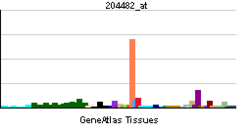CLDN5
| CLDN5 | ||||||
|---|---|---|---|---|---|---|
| Identifiers | ||||||
| Aliases | CLDN5, AWAL, BEC1, CPETRL1, TMVCF, claudin 5 | |||||
| External IDs | MGI: 1276112 HomoloGene: 2459 GeneCards: CLDN5 | |||||
| RNA expression pattern | ||||||
 | ||||||
| More reference expression data | ||||||
| Orthologs | ||||||
| Species | Human | Mouse | ||||
| Entrez | ||||||
| Ensembl | ||||||
| UniProt | ||||||
| RefSeq (mRNA) | ||||||
| RefSeq (protein) | ||||||
| Location (UCSC) | Chr 22: 19.52 – 19.53 Mb | Chr 16: 18.78 – 18.78 Mb | ||||
| PubMed search | [1] | [2] | ||||
| Wikidata | ||||||
| View/Edit Human | View/Edit Mouse |
Claudin-5 is a protein that in humans is encoded by the CLDN5 gene.[3][4][5] It belongs to the group of claudins.
Function
This gene encodes a member of the claudin family. Claudins are integral membrane proteins and components of tight junction strands. Tight junction strands serve as a physical barrier to prevent solutes and water from passing freely through the paracellular space between epithelial or endothelial cell sheets. Mutations in this gene have been found in patients with velocardiofacial syndrome.[5]
Interactions
CLDN5 has been shown to interact with CLDN1[6] and CLDN3.[6]
References
- ↑ "Human PubMed Reference:".
- ↑ "Mouse PubMed Reference:".
- ↑ Peacock RE, Keen TJ, Inglehearn CF (Mar 1998). "Analysis of a human gene homologous to rat ventral prostate.1 protein". Genomics. 46 (3): 443–9. doi:10.1006/geno.1997.5033. PMID 9441748. Check date values in:
|year= / |date= mismatch(help) - ↑ Sirotkin H, Morrow B, Saint-Jore B, Puech A, Das Gupta R, Patanjali SR, Skoultchi A, Weissman SM, Kucherlapati R (Sep 1997). "Identification, characterization, and precise mapping of a human gene encoding a novel membrane-spanning protein from the 22q11 region deleted in velo-cardio-facial syndrome". Genomics. 42 (2): 245–51. doi:10.1006/geno.1997.4734. PMID 9192844.
- 1 2 "Entrez Gene: CLDN5 claudin 5 (transmembrane protein deleted in velocardiofacial syndrome)".
- 1 2 Coyne CB, Gambling TM, Boucher RC, Carson JL, Johnson LG (Nov 2003). "Role of claudin interactions in airway tight junctional permeability". Am. J. Physiol. Lung Cell Mol. Physiol. 285 (5): L1166–78. doi:10.1152/ajplung.00182.2003. PMID 12909588.
Further reading
- Kniesel U, Wolburg H (2000). "Tight junctions of the blood-brain barrier". Cell. Mol. Neurobiol. 20 (1): 57–76. doi:10.1023/A:1006995910836. PMID 10690502.
- Heiskala M, Peterson PA, Yang Y (2001). "The roles of claudin superfamily proteins in paracellular transport". Traffic. 2 (2): 93–8. doi:10.1034/j.1600-0854.2001.020203.x. PMID 11247307.
- Tsukita S, Furuse M, Itoh M (2001). "Multifunctional strands in tight junctions". Nat. Rev. Mol. Cell Biol. 2 (4): 285–93. doi:10.1038/35067088. PMID 11283726.
- Tsukita S, Furuse M (2002). "Claudin-based barrier in simple and stratified cellular sheets". Curr. Opin. Cell Biol. 14 (5): 531–6. doi:10.1016/S0955-0674(02)00362-9. PMID 12231346.
- González-Mariscal L, Betanzos A, Nava P, Jaramillo BE (2003). "Tight junction proteins". Prog. Biophys. Mol. Biol. 81 (1): 1–44. doi:10.1016/S0079-6107(02)00037-8. PMID 12475568.
- King JE, Eugenin EA, Buckner CM, Berman JW (2006). "HIV tat and neurotoxicity". Microbes Infect. 8 (5): 1347–57. doi:10.1016/j.micinf.2005.11.014. PMID 16697675.
- Maruyama K, Sugano S (1994). "Oligo-capping: a simple method to replace the cap structure of eukaryotic mRNAs with oligoribonucleotides". Gene. 138 (1-2): 171–4. doi:10.1016/0378-1119(94)90802-8. PMID 8125298.
- Suzuki Y, Yoshitomo-Nakagawa K, Maruyama K, Suyama A, Sugano S (1997). "Construction and characterization of a full length-enriched and a 5'-end-enriched cDNA library". Gene. 200 (1-2): 149–56. doi:10.1016/S0378-1119(97)00411-3. PMID 9373149.
- Morita K, Furuse M, Fujimoto K, Tsukita S (1999). "Claudin multigene family encoding four-transmembrane domain protein components of tight junction strands". Proc. Natl. Acad. Sci. U.S.A. 96 (2): 511–6. doi:10.1073/pnas.96.2.511. PMC 15167
 . PMID 9892664.
. PMID 9892664. - Itoh M, Furuse M, Morita K, Kubota K, Saitou M, Tsukita S (1999). "Direct binding of three tight junction-associated MAGUKs, ZO-1, ZO-2, and ZO-3, with the COOH termini of claudins". J. Cell Biol. 147 (6): 1351–63. doi:10.1083/jcb.147.6.1351. PMC 2168087
 . PMID 10601346.
. PMID 10601346. - Kojima S, Rahner C, Peng S, Rizzolo LJ (2002). "Claudin 5 is transiently expressed during the development of the retinal pigment epithelium". J. Membr. Biol. 186 (2): 81–8. doi:10.1007/s00232-001-0137-7. PMID 11944085.
- Poliak S, Matlis S, Ullmer C, Scherer SS, Peles E (2002). "Distinct claudins and associated PDZ proteins form different autotypic tight junctions in myelinating Schwann cells". J. Cell Biol. 159 (2): 361–72. doi:10.1083/jcb.200207050. PMC 2173042
 . PMID 12403818.
. PMID 12403818. - Helms HC, Waagepetersen HS, Nielsen CU, Brodin B (2010). "Paracellular tightness and claudin-5 expression is increased in the BCEC/astrocyte blood-brain barrier model by increasing media buffer capacity during growth". AAPS J. 12 (4): 759–70. doi:10.1208/s12248-010-9237-6. PMC 2976989
 . PMID 20967520.
. PMID 20967520. - Liu F, Koval M, Ranganathan S, Fanayan S, Hancock WS, Lundberg EK, Beavis RC, Lane L, Duek P, McQuade L, Kelleher NL, Baker MS (2015). "A systems proteomics view of the endogenous human claudin protein family". J Proteome Res. doi:10.1021/acs.jproteome.5b00769. PMID 26680015.
This article is issued from Wikipedia - version of the 5/19/2016. The text is available under the Creative Commons Attribution/Share Alike but additional terms may apply for the media files.